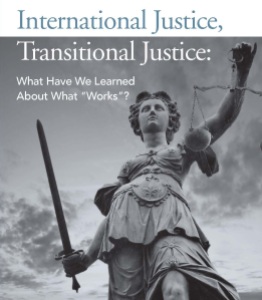Wednesday, February 11, 2009
Human Rights Film Series
Screening of The 3 Rooms of Melancholia (2005)
4 PM
Class of 47 Room, Homer Babbidge Library
Professor Emma Gilligan from the Department of History will provide a brief introduction to the film.
The 3 Rooms of Melancholia (2005), directed by Pirjo Honkasalo, is an award-winning, stunningly beautiful documentary that reveals how the Chechen War has psychologically affected children in Russia and in Chechnya. Divided into three episodes or ‘rooms,’ the film is characterized by an elegantly paced, observational style.
“A beautiful, moving, mysterious film. A prodigious, almost spiritual experience, a luminous, challenging art movie out of the Tarkovsky school that happens to be about a real war and its effects on real children. It was also a daring cinematic enterprise; while the Western media had trouble getting any independent footage from Chechnya, this Finnish art-film director took a film crew there and captured the breathtaking devastation. Put this on your must-see list!”—
Andrew O’Hehi
Thursday, February 12, 2009
A Panel Discussion: “Documenting Peruvian History and the Visual Arts”
with presentations by:
Jose Falconi, David Rockefeller Center for Latin American Studies, Harvard University
Michael Orwicz, Department of Art and Art History, UConn
Kimberly Theidon, Anthropology, Harvard University and Exectutive Director of Praxis Institute for Social Justice
The panel discussion is being held in conjunction with the exhibit, Yuyanapaq: To Remember, at the William Benton Museum of Art from January 20 – March 6, 2009
Yuyanapaq: To Remember is a witness, in words and images, to the extreme political violence that consumed the Peruvian nation between 1980 and 2000. These two decades saw an outbreak of violence that involved insurgents, state armed forces, paramilitary groups, and peasants’ self-defense organizations. It was instigated by the Maoist organization, known as “Shining Path,” and justified as a revolutionary uprising against the Peruvian state. While Shining Path rejected, in general, the idea of human rights as “bourgeois, reactionary, counterrevolutionary rights, [which] are today a weapon of revisionists and imperialists, principally Yankee imperialists,” the government likewise committed human rights violations, although fewer in number and on a lesser scale. In 2003 the Peruvian Truth and Reconciliation Commission issued a report that estimated that 69,280 Peruvians lost their lives during this period. As part of the Truth Commission’s effort to document the history of this period and depict the ways in which violence impacted on Peruvians’ daily lives, an exhibition of 250 photographs was created from more than 90 archives belonging to different media outlets, news agencies, military institutions, human right organizations, and private collections. A traveling exhibition of 40 photographs was organized in 2004 and has been shown in Mexico, Italy, Spain, and Switzerland.




